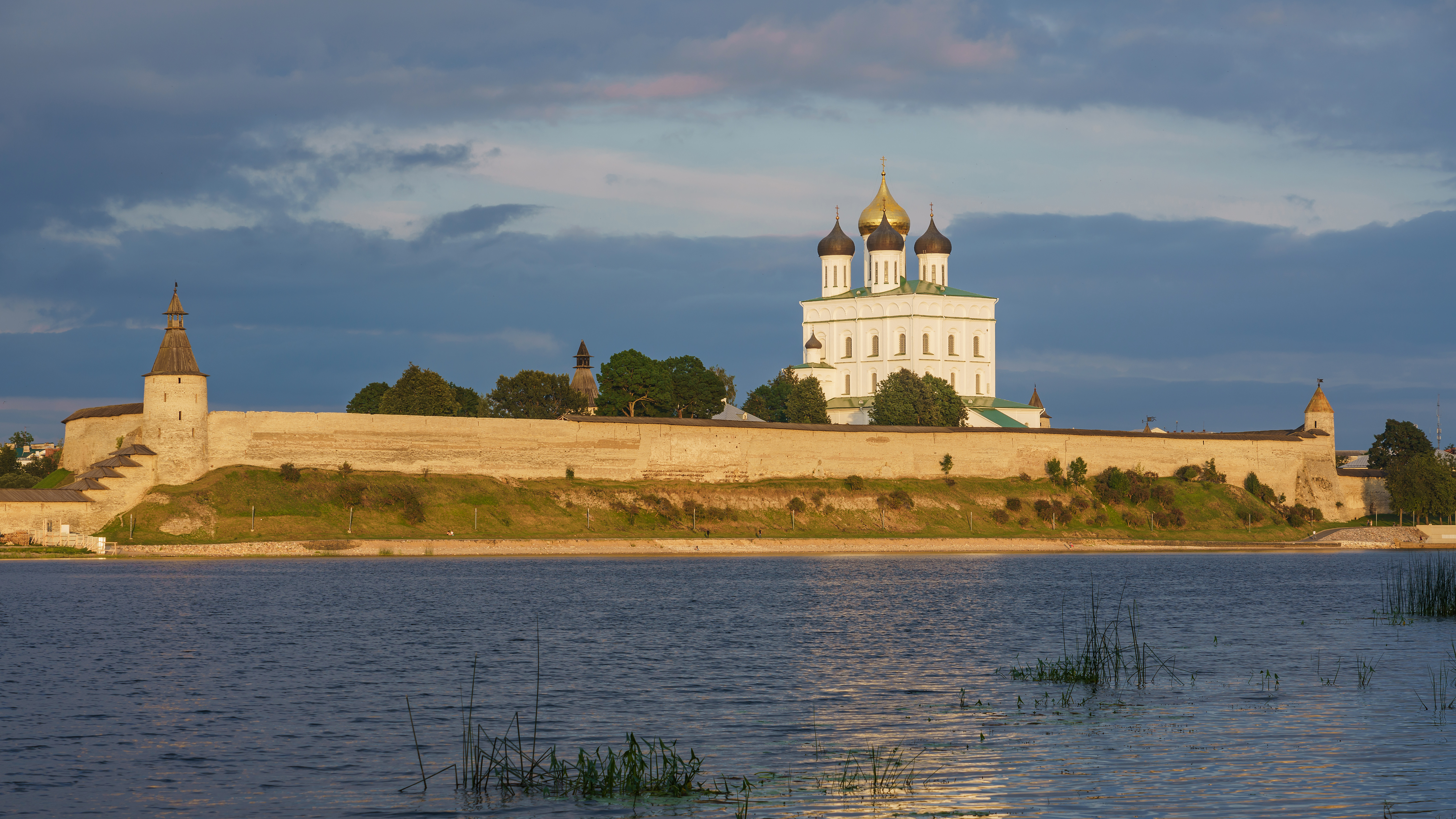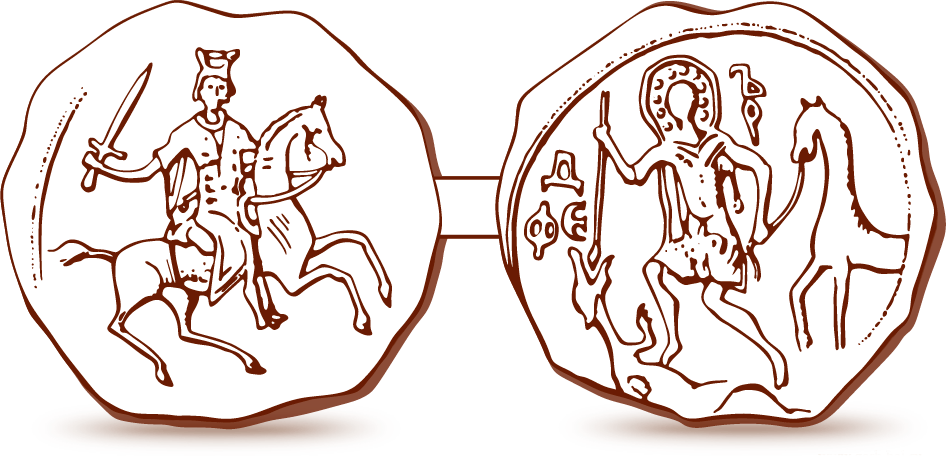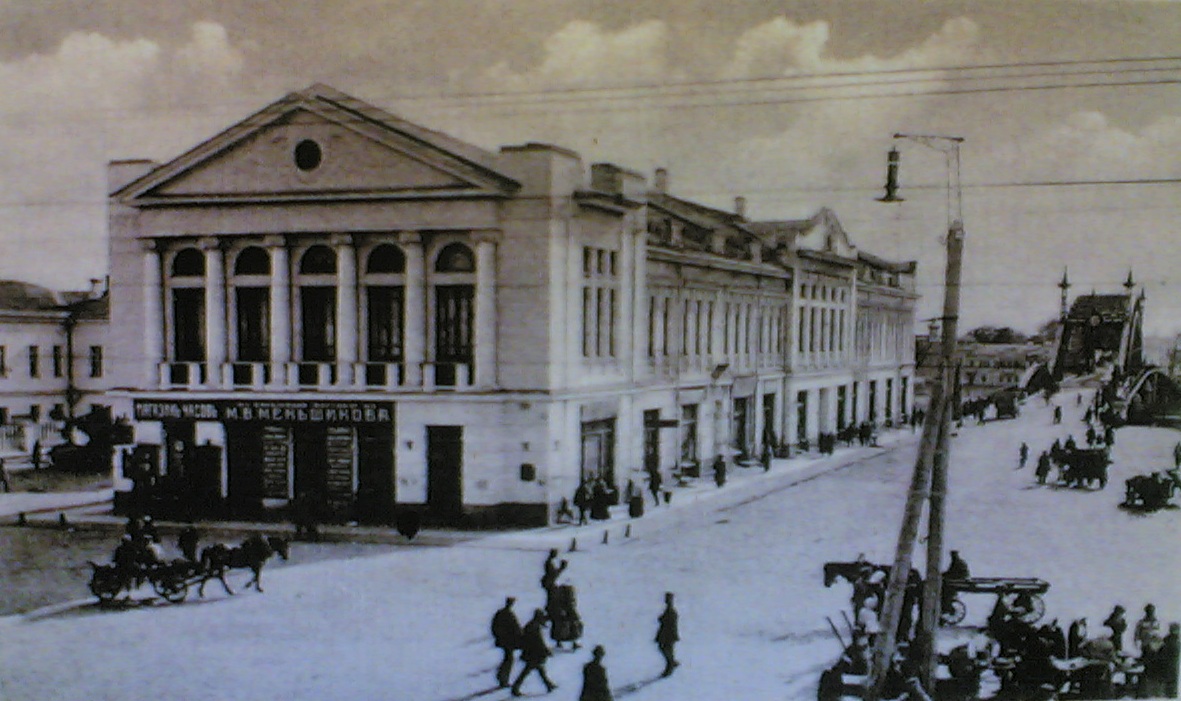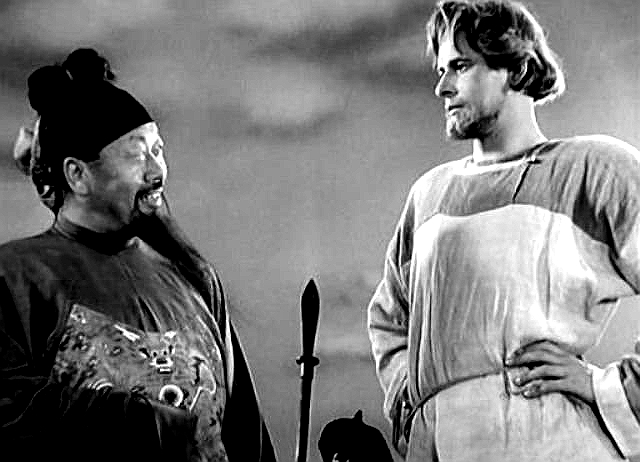|
Pskov
Pskov ( rus, Псков, a=Ru-Псков.oga, p=psˈkof; see also Names of Pskov in different languages, names in other languages) is a types of inhabited localities in Russia, city in northwestern Russia and the administrative center of Pskov Oblast, located about east of the Estonian border, on the Velikaya, Velikaya River. Population: Pskov is one of the oldest cities in Russia. During the Middle Ages, it served as the capital of the Pskov Republic and was a trading post of the Hanseatic League before it was incorporated into the Grand Duchy of Moscow and became an important border fortress in the Tsardom of Russia. History Early history Pskov is one of the oldest cities in Russia. The name of the city, originally Pleskov (historic Russian spelling , ), may be loosely translated as "[the town] of :wikt:purling, purling waters". It was historically known in English as Plescow. Its earliest mention comes in 903, which records that Igor of Kiev married a local lady, Olga ... [...More Info...] [...Related Items...] OR: [Wikipedia] [Google] [Baidu] |
Pskov Republic
The Pskov Republic () was a city-state in northwestern Russia. It is traditionally considered to have won its formal independence from the Novgorod Republic in 1348. Its capital city was Pskov and its territory was roughly equivalent to modern-day Pskov Oblast. History Origins After the disintegration of Kievan Rus' in the 12th century, the city of Pskov and its dependent territory became part of the Novgorod Republic, but it continued to enjoy self-government under the supervision of a ''posadnik'', or chief executive, that was appointed by Novgorod. Pskov had the status of a borough (), but was given the unique right to have boroughs of its own, with Izborsk being the most ancient among them. The first period of self-declared independence lasted from 1228 to 1242, ending when the city was temporarily annexed by the Livonian Order. After being liberated by Aleksandr Nevsky, the city pledged its fealty to the grand prince and Novgorod. Due to Pskov's leading role in the strug ... [...More Info...] [...Related Items...] OR: [Wikipedia] [Google] [Baidu] |
Pskov Oblast
Pskov Oblast () is a federal subjects of Russia, federal subject of Russia (an oblast), located in the west of the country. Its administrative center is the Classification of inhabited localities in Russia, city of Pskov. As of the Russian Census (2021), 2021 Census, its population was 599,084. Geography Pskov Oblast is the westernmost federal subjects of Russia, federal subject of contiguous Russia (Kaliningrad Oblast, while located further to the west, is an enclave and exclave, exclave).1september.ru. Д. В. Заяц (D. V. Zayats).Псковская область (''Pskov Oblast''). It borders with Leningrad Oblast in the north, Novgorod Oblast in the east, Tver Oblast, Tver and Smolensk Oblasts in the southeast, Vitebsk Region, Vitebsk Oblast of Belarus in the south, and with the counties of Latvia (Alūksne Municipality, Balvi Municipality, and Ludza Municipality) and Estonia (Võru County) in the west. In the northwest, Pskov Oblast is limited by Lake Peipus, which ma ... [...More Info...] [...Related Items...] OR: [Wikipedia] [Google] [Baidu] |
Pskovsky District
Pskovsky District () is an administrativeLaw #833-oz and municipalLaw #419-oz district (raion), one of the administrative divisions of Pskov Oblast, twenty-four in Pskov Oblast, Russia. It is located in the northwest of the oblast and borders with Gdovsky District in the north, Strugo-Krasnensky District in the northeast, Porkhovsky District in the east, Ostrovsky District, Pskov Oblast, Ostrovsky District in the south, and with Palkinsky District, Palkinsky and Pechorsky Districts in the southwest. Lake Peipus forms the border with Estonia in the west. The area of the district is . Its administrative center is the types of inhabited localities in Russia, city of Pskov (which is not administratively a part of the district). Population: 37,216 (Russian Census (2002), 2002 Census); Geography The district is located east and southeast of Lake Peipus, into which the rivers in the north of the district flow directly. The central and the southern parts of the district lie in the drainag ... [...More Info...] [...Related Items...] OR: [Wikipedia] [Google] [Baidu] |
Novgorod Republic
The Novgorod Republic () was a medieval state that existed from the 12th to 15th centuries in northern Russia, stretching from the Gulf of Finland in the west to the northern Ural Mountains in the east. Its capital was the city of Novgorod. The republic prospered as the easternmost trading post of the Hanseatic League, and its people were much influenced by the culture of the Byzantines, with the Novgorod school of icon painting producing many fine works. Novgorod won its independence in 1136 after the Novgorodians deposed their prince and the Novgorod ''veche'' began to elect and dismiss princes at its own will. The ''veche'' also elected the '' posadnik'', who was the chief executive of the city, and the archbishop of Novgorod, subject to approval by the Russian metropolitan. The '' tysyatsky'' was also elected by the ''veche'', who was originally the military commander, and served the interests of the common people. Novgorodian nobles known as boyars dominated the ''vech ... [...More Info...] [...Related Items...] OR: [Wikipedia] [Google] [Baidu] |
Daumantas Of Pskov
Daumantas, Domantas or Dovmont (; Christian name: ''Timothy'' (Тимофей); died 20 May 1299) was Prince of Pskov from 1266 to 1299. During his term in office, Pskov became '' de facto'' independent from Novgorod. He is venerated as a saint in the Eastern Orthodox Church with his feast day observed on 20 May. In Lithuania Until 1265, Daumantas was Duke of Nalšia, a northern province of the Grand Duchy of Lithuania, and was an ally of King Mindaugas. Mindaugas' and Daumantas' wives were sisters. In spite of the family relationship, Daumantas chose to ally himself with Mindaugas' nephew Treniota, who was Duke of Samogitia. Treniota had been steadily increasing his personal power within the kingdom as he tried to spark an all-Balts rebellion against the Teutonic Knights and the Livonian Order. In 1263, Daumantas assassinated Mindaugas and two of his sons. It has been suggested that he acted in collusion with Treniota. As a result, the Grand Duchy of Lithuania relapsed i ... [...More Info...] [...Related Items...] OR: [Wikipedia] [Google] [Baidu] |
Pskov Krom
The Pskov Krom (), also known as the Pskov Kremlin (), is a citadel in Pskov, Russia. In the central part of the city, the Krom is located at the junction of the Velikaya and Pskova rivers.Maclean, Fitzroy (18 March 1979Pskov: A Journey Into Russia's Past; Pskov: An Old Russian City ''The New York Times''(14 May 2009)Krom and Dovmontov gorod: the urban node of medieval Pskov russia-ic.com, Retrieved May 27, 2011 The citadel is of medieval origin, with the surrounding walls constructed starting in the late 15th century.Nossov, Konstantin.Russian Fortresses 1480-1682 p.37 (2006) History The Krom was the administrative and spiritual centre of the Pskov Republic The Pskov Republic () was a city-state in northwestern Russia. It is traditionally considered to have won its formal independence from the Novgorod Republic in 1348. Its capital city was Pskov and its territory was roughly equivalent to modern-d ... in the 15th century. In 2010, two of the towers of the Krom (the Vlasye ... [...More Info...] [...Related Items...] OR: [Wikipedia] [Google] [Baidu] |
Velikaya
The Velikaya () is a river in Novosokolnichesky, Pustoshkinsky, Sebezhsky, Opochetsky, Pushkinogorsky, Ostrovsky, Palkinsky, and Pskovsky Districts of Pskov Oblast, as well as in the city of Pskov in Russia. It is the largest tributary of Lake Peipus and belongs to the drainage basin of the Narva. It is long, and the area of its basin . The name of the river literally means "Grand" or "Great" in Russian. The towns of Opochka, Ostrov and Pskov are located on the banks of the Velikaya. The principal tributaries of the Velikaya are the Alolya (right), the Issa (left), the Sorot (right), the Sinyaya (left), the Utroya (left), the Kukhva (left), the Cheryokha (right), and the Pskova (right). The source of the Velikaya is located in the Bezhanitsy Hills in the northwest of Novosokolnichesky District. The river flows south through a system of lakes to Lake Veryato, where it turns west. It accepts the Alolya from the right and gradually turns north, passing through the ... [...More Info...] [...Related Items...] OR: [Wikipedia] [Google] [Baidu] |
Olga Of Kiev
Olga (; ; – 11 July 969) was a regent of Kievan Rus' for her son Sviatoslav from 945 until 957. Following her baptism, Olga took the name Elenа. She is known for her subjugation of the Drevlians, a tribe that had killed her husband Igor. Even though it was her grandson Vladimir who adopted Christianity and made it the state religion, she was the first ruler to be baptized. Olga is venerated as a saint in the Eastern Orthodox Church with the epithet "Equal to the Apostles". Her feast day is 11 July. Early life While Olga's birthdate is unknown, it could be as early as 890 AD and as late as 925 AD.Michael S. Flier, "St Olga," in ''The Oxford Dictionary of the Middle Ages'', ed. Robert E. Bjork (Oxford: Oxford University Press, 2010). According to the ''Primary Chronicle,'' Olga was of Varangian (Viking) origin and was born in Pleskov. Little is known about her life before her marriage to Prince Igor I of Kiev and the birth of their son, Sviatoslav. According to Alexey K ... [...More Info...] [...Related Items...] OR: [Wikipedia] [Google] [Baidu] |
Alexander Nevsky
Alexander Yaroslavich Nevsky (; ; monastic name: ''Aleksiy''; 13 May 1221 – 14 November 1263) was Prince of Novgorod (1236–1240; 1241–1256; 1258–1259), Grand Prince of Kiev (1249–1263), and Grand Prince of Vladimir (1252–1263). Commonly regarded as a key figure in medieval Russian history, Alexander was a grandson of Vsevolod the Big Nest and rose to legendary status on account of his military victories in northwestern Russia over Swedish invaders in the 1240 Battle of the Neva, as well as German crusaders in the 1242 Battle on the Ice. He preserved Eastern Orthodoxy, agreeing to pay tribute to the powerful Golden Horde. Metropolitan Macarius of Moscow canonized Alexander Nevsky as a saint of the Russian Orthodox Church in 1547. Early life Born in Pereslavl-Zalessky around the year 1220, Alexander was the second son of Prince Yaroslav Vsevolodovich. His mother was , daughter of Mstislav Mstislavich The Bold. From the ''Tales of the Life and Courage of the ... [...More Info...] [...Related Items...] OR: [Wikipedia] [Google] [Baidu] |
Pskov City Duma
The Pskov City Duma () is the city duma of Pskov, Russia. A total of 25 deputies are elected for five-year terms. History The Pskov City Duma was originally established in 1785 as part of Catherine II Catherine II. (born Princess Sophie of Anhalt-Zerbst; 2 May 172917 November 1796), most commonly known as Catherine the Great, was the reigning empress of Russia from 1762 to 1796. She came to power after overthrowing her husband, Peter III ...'s reforms on local government, with the first meeting being held in 1789. Elections 2017 2022 References Pskov City councils in Russia {{Russia-gov-stub ... [...More Info...] [...Related Items...] OR: [Wikipedia] [Google] [Baidu] |
Alexander Nevsky (film)
''Alexander Nevsky'' () is a 1938 Soviet historical drama film directed by Sergei Eisenstein. It depicts the attempted invasion of Novgorod in the 13th century by the Teutonic Knights of the Holy Roman Empire and their defeat by Prince Alexander, known popularly as Alexander Nevsky (1220–1263). Eisenstein made the film in association with Dmitri Vasilyev and with a script co-written with Pyotr Pavlenko; they were assigned to ensure that Eisenstein did not stray into " formalism" and to facilitate shooting on a reasonable timetable. It was produced by Goskino via the Mosfilm production unit, with Nikolai Cherkasov in the title role and a musical score by Sergei Prokofiev. ''Alexander Nevsky'' was the first and most popular of Eisenstein's three sound films. Eisenstein, Pavlenko, Cherkasov and Abrikosov were awarded the Stalin Prize in 1941 for the film. In 1978, the film was included in the world's 100 best motion pictures according to an opinion poll conducted by the It ... [...More Info...] [...Related Items...] OR: [Wikipedia] [Google] [Baidu] |
Grand Duchy Of Moscow
The Grand Principality of Moscow, or Muscovy, known as the Principality of Moscow until 1389, was a late medieval Russian monarchy. Its capital was the city of Moscow. Originally established as a minor principality in the 13th century, the grand principality was transformed into a centralized Russian state in the late 15th century. Moscow became a separate principality when Daniel of Moscow, Daniel (), the youngest son of Alexander Nevsky, received the city and surrounding area as an appanage. By the end of the 13th century, Moscow had become one of the leading principalities within the Vladimir-Suzdal, Vladimir grand principality, alongside Principality of Tver, Tver. A struggle between the princes of Moscow and Tver began after Mikhail of Tver became Grand Prince of Vladimir, grand prince in 1304. Yury of Moscow, Yury () contested the title and was later made grand prince in 1318 by the Khan (title), khan of the Golden Horde, who held suzerainty over the princes. However, Yu ... [...More Info...] [...Related Items...] OR: [Wikipedia] [Google] [Baidu] |









